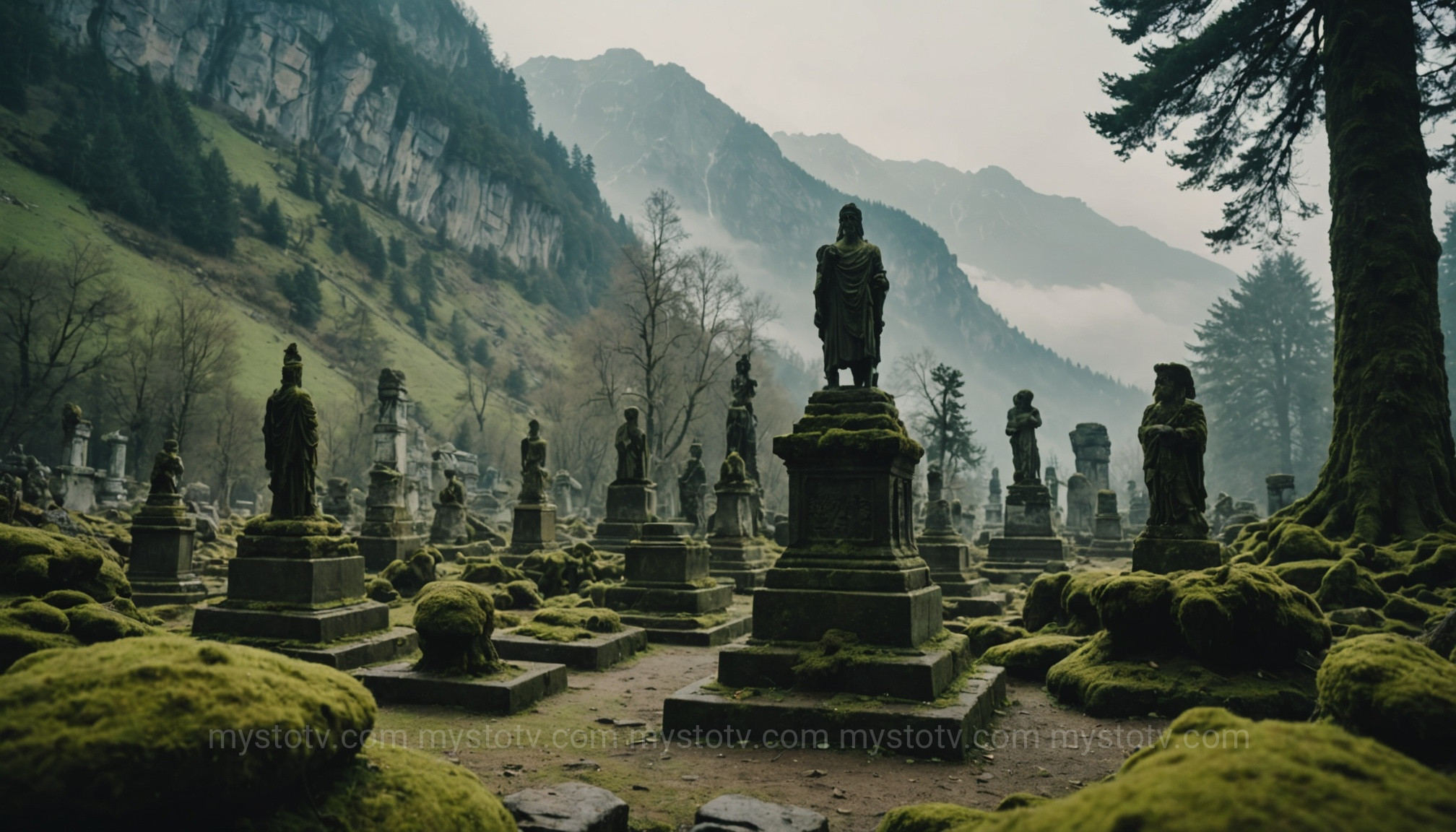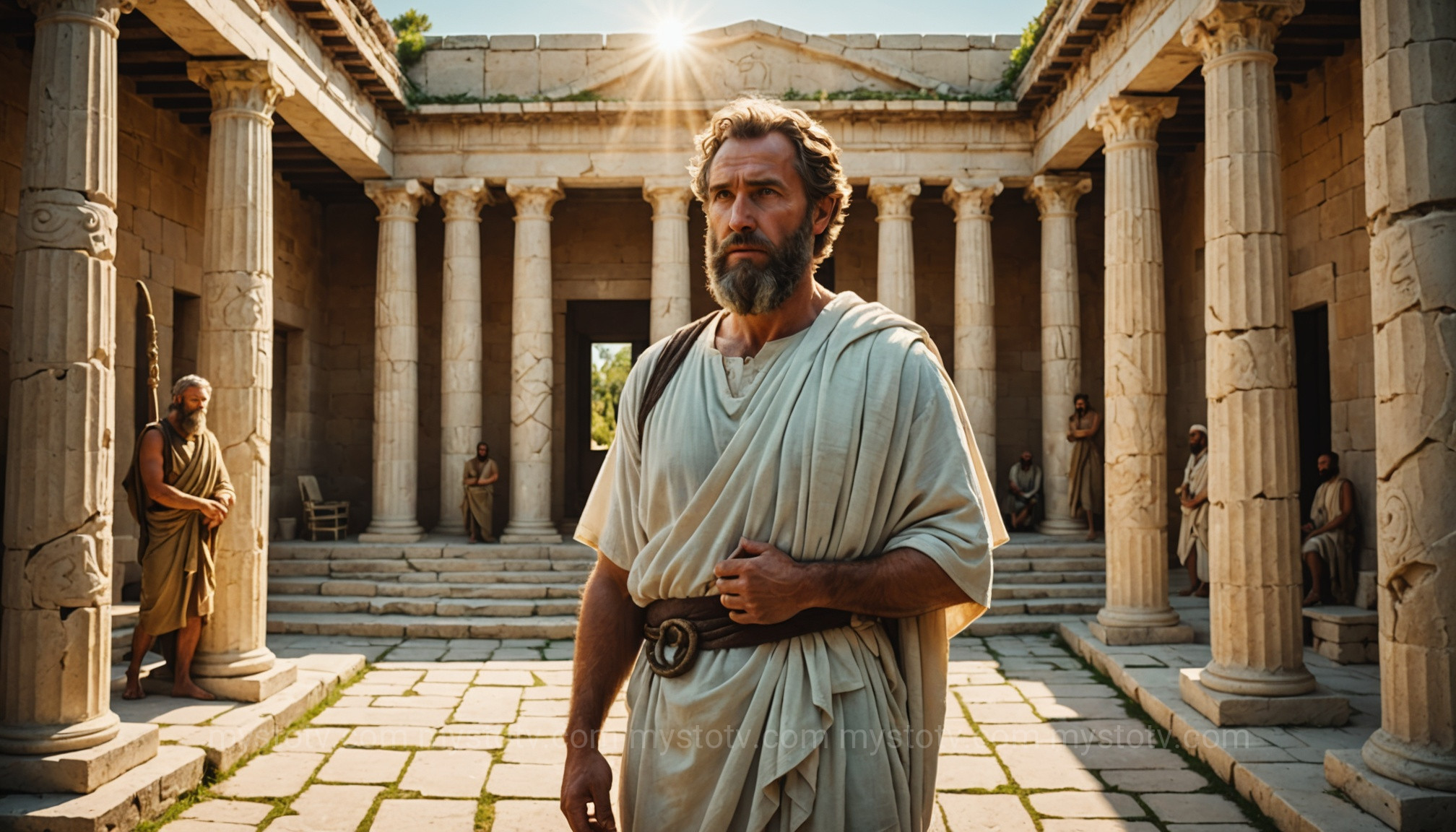Contents
- 1 Introduction: Beyond Zeus and Hera
- 2 Beyond Olympus: Unveiling the 10 Most Forgotten Greek Gods
- 2.1 1. Hecate: The Misunderstood Goddess of Magic and Crossroads
- 2.2 2. Nemesis: The Inescapable Agent of Retribution
- 2.3 3. Tyche: The Fickle Goddess of Fortune and Chance
- 2.4 4. Hypnos & Thanatos: The Twin Brothers of Sleep and Death
- 2.5 5. Asclepius: The Deified Healer and God of Medicine
- 2.6 6. Eris: The Goddess of Strife and Discord
- 2.7 7. Hebe: The Divine Cupbearer and Goddess of Youth
- 2.8 8. Pan: The Rustic God of the Wilds and Panic
- 2.9 9. Morpheus: The Shaper of Dreams
- 2.10 10. Philotes: The Spirit of Friendship and Affection
- 3 Frequently Asked Questions About Obscure Greek Deities
- 4 References
- 5 Conclusion: A Richer, More Complete Pantheon
Introduction: Beyond Zeus and Hera
I remember my first brush with Greek mythology in a dusty middle school classroom. The stories of Zeus's thunderbolts, Poseidon's trident, and Hades's shadowy realm were intoxicating. For years, I thought I had a decent handle on the Greek pantheon. It wasn't until I started digging deeper for a personal research project that I had a startling realization: the figures we learn about are just the celebrity headliners of a vast, complex spiritual ecosystem. I discovered an entire roster of deities who were just as vital to the ancient Greeks but have since faded from our collective memory. This journey uncovered some of the most forgotten greek gods, divine beings whose stories add incredible depth and nuance to our understanding of the ancient world. They are the gods of specific fears, nuanced concepts, and the quiet moments of human existence, proving the pantheon is far richer than we were ever taught.
Beyond Olympus: Unveiling the 10 Most Forgotten Greek Gods

When we discuss Greek mythology, our focus invariably lands on the twelve Olympians. They are the powerful, dramatic, and often dysfunctional family that dominates the epic tales. Yet, dwelling in the shadows of their grand narratives are countless other deities, spirits, and personifications who were essential to the fabric of ancient Greek belief. These figures represent concepts far more specific and intimate than thunder or the sea; they embody retribution, sleep, chance, and discord. Exploring these entities reveals a more granular and relatable spiritual world. Let's pull back the veil and meet ten of the most forgotten greek gods who deserve to be remembered.
1. Hecate: The Misunderstood Goddess of Magic and Crossroads
While Hecate has gained some modern popularity in Wiccan and Neopagan traditions, her original role is often simplified or misconstrued. Far from a simple "crone" or purely malevolent figure, Hecate was a powerful and respected Titan-goddess who retained her authority even after the Olympians took power. She was a liminal deity, holding sway over crossroads, entrances, and the boundaries between worlds. She was often depicted with three faces to observe all directions, accompanied by her hounds, and carrying torches to light the way in the darkness.
Analysis of Obscurity: Hecate's path to becoming one of the most forgotten greek gods in mainstream mythology is tied to her complex nature. She wasn't an Olympian and her domain—magic, witchcraft, ghosts, and the night—was often viewed with a mixture of reverence and fear. As Christianity spread, figures associated with magic were more easily demonized, pushing Hecate further into the esoteric shadows and away from the "classical" pantheon taught in schools.
2. Nemesis: The Inescapable Agent of Retribution

Nemesis is a name we still use today, but few remember the goddess behind the concept. She was not the goddess of revenge in a petty sense, but of divine retribution. Her purpose was to restore balance by punishing those guilty of hubris—arrogance against the gods. If a mortal became too proud, too wealthy, or too boastful, it was Nemesis who would bring them back down to earth, often with a cruel twist of fate. She represented the idea that no one, mortal or god, could escape the natural order and consequences of their actions.
Analysis of Obscurity: Nemesis's abstract nature makes her a difficult character to weave into narrative epics. Unlike Ares who loves war or Aphrodite who embodies love, Nemesis is a concept personified. Her stories are less about her personality and more about the mortals she affects. This functional role makes her less of a "character" and more of a plot device, contributing to her status among the most forgotten greek gods.
3. Tyche: The Fickle Goddess of Fortune and Chance
In a world without a scientific understanding of probability, the Greeks had Tyche. She was the goddess of fortune, chance, and providence. She could shower a city with prosperity or bring it to ruin on a whim. She was often depicted as blindfolded, holding a cornucopia (horn of plenty) filled with riches that she might bestow randomly, or standing on a ball to represent the unsteadiness of luck. Cities would have their own specific version of Tyche, praying to her for protection and good fortune.
Analysis of Obscurity: Tyche was later heavily syncretized with the Roman goddess Fortuna, who largely overshadowed her Greek counterpart in Western culture. Furthermore, as philosophies like Stoicism—which emphasized virtue over luck—gained traction, the influence of a purely chance-based deity waned. This philosophical shift helped make her one of the most forgotten greek gods.
4. Hypnos & Thanatos: The Twin Brothers of Sleep and Death
Often mentioned in passing but rarely explored, Hypnos (Sleep) and Thanatos (Peaceful Death) were twin brothers, the sons of Nyx (Night). They resided in the underworld and worked in concert. Hypnos was a gentle deity who could bring rest to mortals and gods alike, often depicted as a young man with wings on his shoulders or brow. His brother, Thanatos, was not a malevolent figure like a modern "grim reaper." He was the personification of a non-violent, peaceful death, the gentle end that came to the elderly or the weary. It was the Keres, his sisters, who were the spirits of violent or cruel death.
Analysis of Obscurity: These twin brothers are prime examples of the most forgotten greek gods because their roles are often subsumed by a larger, more dramatic figure: Hades. While Hades is the king of the underworld, he is not death itself. The nuance of a gentle death (Thanatos) versus a violent one (Keres) or simply the state of being unconscious (Hypnos) is often lost in simplified retellings of the myths, which prefer the singular, imposing figure of Hades.
5. Asclepius: The Deified Healer and God of Medicine

Asclepius was so skilled a physician that he was said to be able to bring the dead back to life. The son of Apollo and a mortal woman, Coronis, he became the god of medicine and healing. His symbol, the Rod of Asclepius (a snake entwining a staff), remains a symbol of medicine to this day. His healing temples, known as Asclepeions, were ancient hospitals where patients would come to be cured, often through a process of purification and dream incubation.
Analysis of Obscurity: Asclepius's story is fascinating—he was a mortal who achieved godhood through his skill. However, his father, Apollo, was also a god of healing, and often takes the credit in broader mythological summaries. Furthermore, Asclepius's role is highly specialized. He doesn't feature in the grand wars or family squabbles of the Olympians, making him a less dramatic, and thus one of the most forgotten greek gods in popular culture, despite his symbol's enduring legacy.
6. Eris: The Goddess of Strife and Discord
If you've heard of the Trojan War, you've witnessed the work of Eris. Famously uninvited to the wedding of Peleus and Thetis, she tossed a Golden Apple inscribed "To the Fairest" among the goddesses, sparking the divine vanity contest that led directly to the war. Eris thrives on chaos, conflict, and rivalry. She is the personification of the strife that can tear families, cities, and civilizations apart. She is the mother of a host of grim figures, including Toil, Forgetfulness, and Lawlessness.
Analysis of Obscurity: Eris is another deity who often acts as an instigator rather than a main character. She sets events in motion and then disappears from the narrative. Her singular, negative role makes her less multi-dimensional than the Olympians, who exhibit a wider range of emotions and actions. Her nature as a pure catalyst has made her one of the most forgotten greek gods, remembered for one famous act but not as a personality.
7. Hebe: The Divine Cupbearer and Goddess of Youth
Hebe was the original cupbearer to the gods on Mount Olympus, serving them nectar and ambrosia. As the daughter of Zeus and Hera, she held a privileged position. She is the goddess of youth and the patroness of brides. She eventually married the deified hero Heracles after he ascended to Olympus. Her role, while seemingly simple, was crucial—she was the keeper of eternal youth, a quality the gods cherished above all else.
Analysis of Obscurity: Hebe's role was largely domestic and ceremonial. In the myths, she was eventually replaced as cupbearer by the Trojan prince Ganymede. This replacement effectively wrote her out of a key role in Olympian daily life, diminishing her importance in subsequent stories. Her quiet, functional role lacks the drama and conflict that keeps other gods in the spotlight, making her a classic example of the most forgotten greek gods. Her marriage to the hero Heracles is one of her most significant mythological events.
8. Pan: The Rustic God of the Wilds and Panic
Pan is more recognizable than many on this list, but his true, often terrifying nature is frequently forgotten. He is not a "cute" faun. Pan is the god of the wilds, shepherds, and rustic music. With the hindquarters and horns of a goat, his appearance could be jarring. His music, played on his eponymous pan pipes, could be enchanting, but his wild, untamed nature also inspired a specific kind of terror: panic. The word itself comes from his name, describing the irrational, sudden fear one might feel in a desolate, lonely place.
Analysis of Obscurity: The modern, sanitized image of Pan as a gentle nature spirit has obscured his original, more primal and dangerous form. The "Pan" we think we know is a simplified caricature. The association of his goat-like features with later Christian depictions of the devil also led to his demonization and suppression, ensuring his true, complex nature remains among the stories of the most forgotten greek gods.
9. Morpheus: The Shaper of Dreams
While his father Hypnos is the god of sleep itself, Morpheus has a more specific job: he is the god of dreams. Specifically, he is responsible for shaping the dreams of mortals, often appearing in them in human form. He could mimic any person perfectly, delivering divine messages or personal prophecies through the subconscious mind. He is one of the Oneiroi, the sons of Hypnos who presided over different aspects of dreams. Morpheus was the leader and the one who dealt with human figures and stories within dreams.
Analysis of Obscurity: The specificity of Morpheus's role makes him a minor character in the grand scheme. The entire concept of sleep and dreams is often credited solely to his more powerful father, Hypnos. This division of labor, while fascinating, means Morpheus is often seen as a subordinate spirit rather than a god in his own right, landing him on the list of the most forgotten greek gods.
10. Philotes: The Spirit of Friendship and Affection
Perhaps the most obscure on this list, Philotes was the personification of friendship, affection, and tenderness. Like her brothers Hypnos and Thanatos, she was a child of Nyx (Night). She represents a concept completely antithetical to her sister Eris (Strife). Philotes was not a goddess of grand temples but of the quiet, crucial bonds between people. She embodies the warmth of camaraderie and the gentle affection that builds communities.
Analysis of Obscurity: Philotes is the ultimate example of a concept-driven deity who is easily forgotten. Greek myths thrive on drama, war, and conflict. A goddess whose entire domain is positive, gentle, and undramatic has very little to do in the epic tales. There are no great myths about Philotes because her work is quiet and constant. This lack of narrative presence makes her one of the absolute most forgotten greek gods, a beautiful concept that unfortunately makes for a poor story.
Frequently Asked Questions About Obscure Greek Deities
Delving into the lesser-known figures of the Greek pantheon often raises more questions. Here are answers to a few common queries about these fascinating, forgotten beings.
Why are some deities considered the most forgotten Greek gods?
Several factors contribute to a god's obscurity. Firstly, many were personifications of abstract concepts (like Philotes/Friendship or Momus/Blame) rather than dynamic characters, making them difficult to include in narrative myths. Secondly, some had highly specialized or local domains, worshipped intensely in one city but unknown elsewhere. Thirdly, as religious and philosophical beliefs evolved, some deities were either assimilated into more powerful ones (like Tyche into Fortuna) or their domains (like magic or panic) were demonized by later religions, pushing them out of the mainstream.
Can we find references to these forgotten gods in ancient texts?
Absolutely. While they may not star in epic poems like the Iliad or Odyssey, these gods are frequently mentioned in other important works. The poet Hesiod's Theogony is a key source, as it details the genealogy of the gods and names many of these abstract personifications. The writings of playwrights like Aeschylus and Euripides, and travel writers like Pausanias, also provide invaluable descriptions of local cults, temples, and beliefs related to many of the most forgotten greek gods.
Are there modern interpretations or worship of these lesser-known gods?
Yes, particularly within Hellenic Polytheism (Hellenism), a modern reconstructionist religion. Adherents actively worship the full spectrum of Greek deities, including many of the forgotten ones. Figures like Hecate have a prominent place in modern pagan and Wiccan traditions. Additionally, artists, writers, and creators continue to rediscover and reinterpret these gods, bringing their stories and concepts to new audiences, as seen in popular media like the video game Hades, which features Hypnos, Thanatos, and Nemesis.
References
- Atsma, Aaron J. Theoi Project: Greek Mythology. 2000-2017. https://www.theoi.com/
- Hesiod. Theogony and Works and Days. Translated by M. L. West, Oxford University Press, 1988.
- Pausanias. Description of Greece. Translated by W.H.S. Jones, Litt.D., and H.A. Ormerod, M.A., in 4 Volumes. Harvard University Press, 1918. https://www.perseus.tufts.edu/hopper/text?doc=Perseus:text:1999.01.0160
Conclusion: A Richer, More Complete Pantheon
The stories of Zeus, Apollo, and Athena are foundational, but they are not the complete picture. By exploring the pantheon's shadowed corners, we uncover a spiritual world that was far more personal, nuanced, and comprehensive than the popular myths suggest. The most forgotten greek gods are not merely footnotes; they are the deities of everyday life—of luck and sleep, of friendship and retribution. Remembering figures like Nemesis, Hecate, and Asclepius enriches our understanding of the ancient Greek mindset, revealing the values, fears, and hopes that shaped their world. They prove that even in mythology, the most profound truths are often found not in the thunderous declarations from on high, but in the quiet whispers from the forgotten corners of the cosmos.